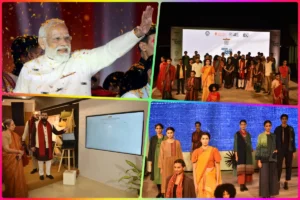
With the G20 meeting in Kashmir over, it’s time to look at it from a perspective often ignored by political commentators at home and abroad. All discussions are limited to positive and negative, but it is equally important to note that the events were peaceful and free of unfortunate incidents.
Unlike before, the atmosphere was not disturbed by violence by dissidents operating inside and outside the borders. Even if the government had to cancel some planned destinations at short notice for safety reasons, credit would be given for ensuring a happy ending.
However,
this is more than just his one-day accomplishment, it reflects the changes the government has been able to push since 5 August 2019. While the government led by Manoj Sinha maintained stability in Jammu and Kashmir, New Delhi cut off Rawalpindi’s wings, eroding both his reputation and his courage.
One of the funniest and most useful ways to put things in perspective is to make comparisons.
While
the first G20 event was held in Jammu and Kashmir without internet blockades, movement restrictions, raids and all the familiar stuff from the past, the situation across the border was quite the opposite.
Rawalpindi
suspended the constitution and the internet, set up military courts for civilians, and cracked down on political activists, including women and children. To make matters worse, the appointed Foreign Minister Bilawal Zardari was in India preaching on human rights and international law.
The presence of the overwhelming majority of G20 countries in the conference underscores India’s position not only for economic and geopolitical reasons, as might be expected. It has a lot to do with the trust the international community has in India and its democratic values.
As Rawalpindi continues to use military tribunals against civilians who have dared to challenge his political framework and the suspension of voting rights, the international community has warned that India itself has killed dozens of Ajmal Kasab. I’ve seen them provide fair trials for hardcore terrorists like /11 plot.
This comparison may be irrelevant to the topic of discussion. However, this is relevant to the context of the discussion as it is probably the first time Kashmiris have wholeheartedly accepted and attended the event.
After months of work by the administration to raise awareness of the importance of the event, efforts to align infrastructure development with the event as part of a smart city project have won public support.
The renovation and reconstruction of public spaces within the city limits and public relations activities carried out on the eve of the G20 not only brought cheers to residents, but also enabled them to address G20 issues. Residents not only gathered at these accommodations, but also actively participated in online campaigns leading up to the G20 Kashmir Summit.
The government led by Manoj Sinha deserves praise and admiration not only for its plans but also for its actions. But politicians have widely criticized the government for “restricting the movement of people”. This criticism that equates inconvenience with limitation is unjustified. Inconveniences are natural in a venue hosting such a large event. Perhaps they forgot that roads and highways were closed under surveillance so that the convoy could move smoothly.
It’s not about mocking them, it’s about acknowledging they had safety concerns. You know this, and you should be polite and respectful of the government’s efforts to cause as little inconvenience as possible to local residents. Given Kashmir’s questionable political climate, holding the G20 meeting was a crucial step. At the end of the day, participants presented representative pictures of Kashmir full of possibilities. This comparison may be irrelevant to the topic of discussion. However, this is relevant to the context of the discussion as it is probably the first time Kashmiris have wholeheartedly accepted and attended the event.
After months of work by the administration to raise awareness of the event’s importance, efforts to link infrastructure development with the event as part of a smart city project have won public support.
To read more such news, download Bharat Express news apps





















